Analyzing Racial Identity: Personal Reflections and Societal Impact
VerifiedAdded on 2022/09/12
|6
|1117
|20
Essay
AI Summary
This essay provides a personal reflection on the author's racial identity as a Black individual in the United States, discussing the challenges and pressures faced within their college community. The essay examines how the author's identity is shaped by cultural and social expectations, as well as media portrayals of race and the history of racial discrimination. The author explores the politicization of racial identity and its impact on their personal values and expectations, particularly in relation to education. The essay also includes an annotated bibliography of relevant sources that support the author's arguments, providing credibility to the analysis of racial identity and its impact on individual lives within a broader societal context. The essay concludes by emphasizing the continued prevalence of racial discrimination and its negative impact on the lives of individuals and communities.
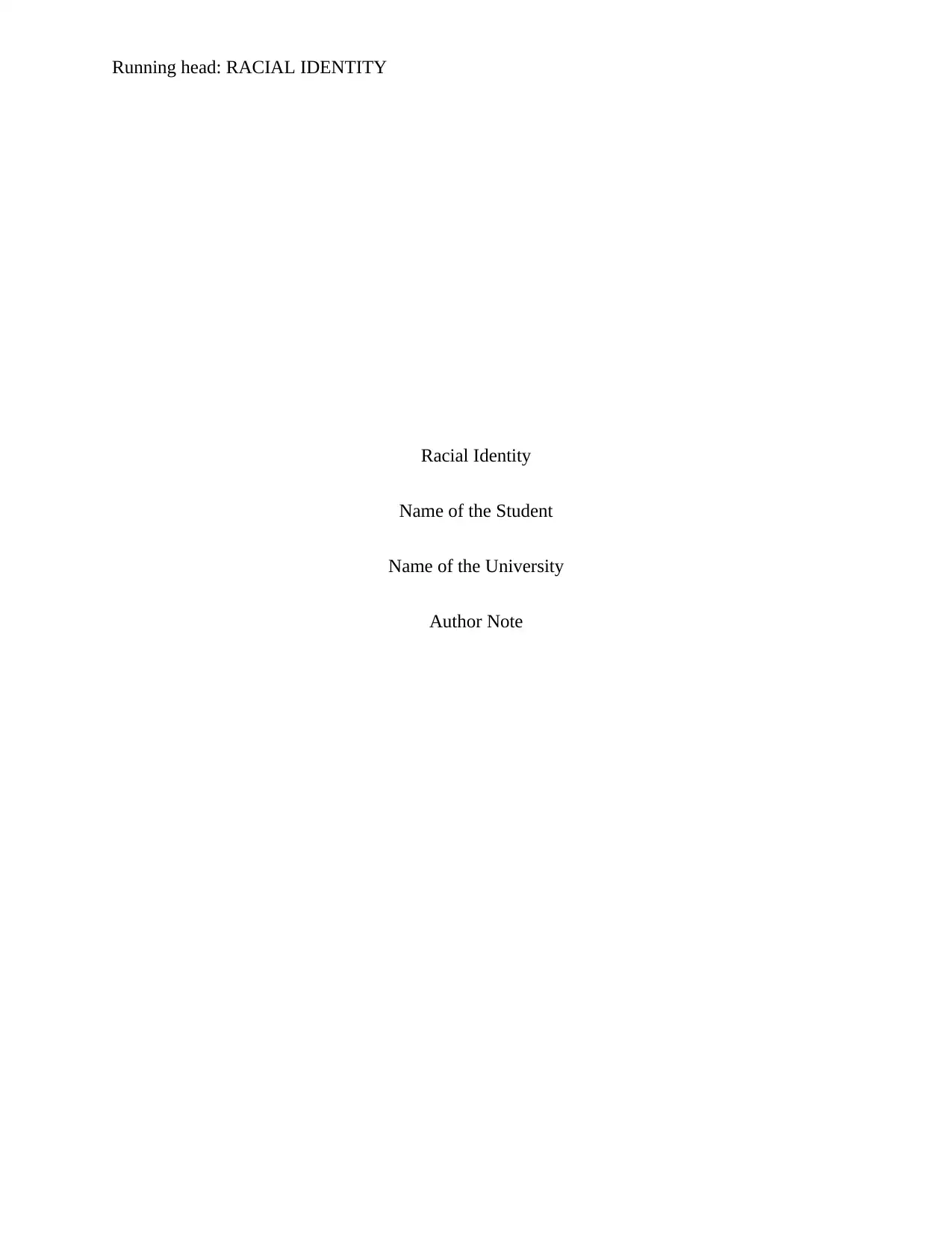
Running head: RACIAL IDENTITY
Racial Identity
Name of the Student
Name of the University
Author Note
Racial Identity
Name of the Student
Name of the University
Author Note
Paraphrase This Document
Need a fresh take? Get an instant paraphrase of this document with our AI Paraphraser
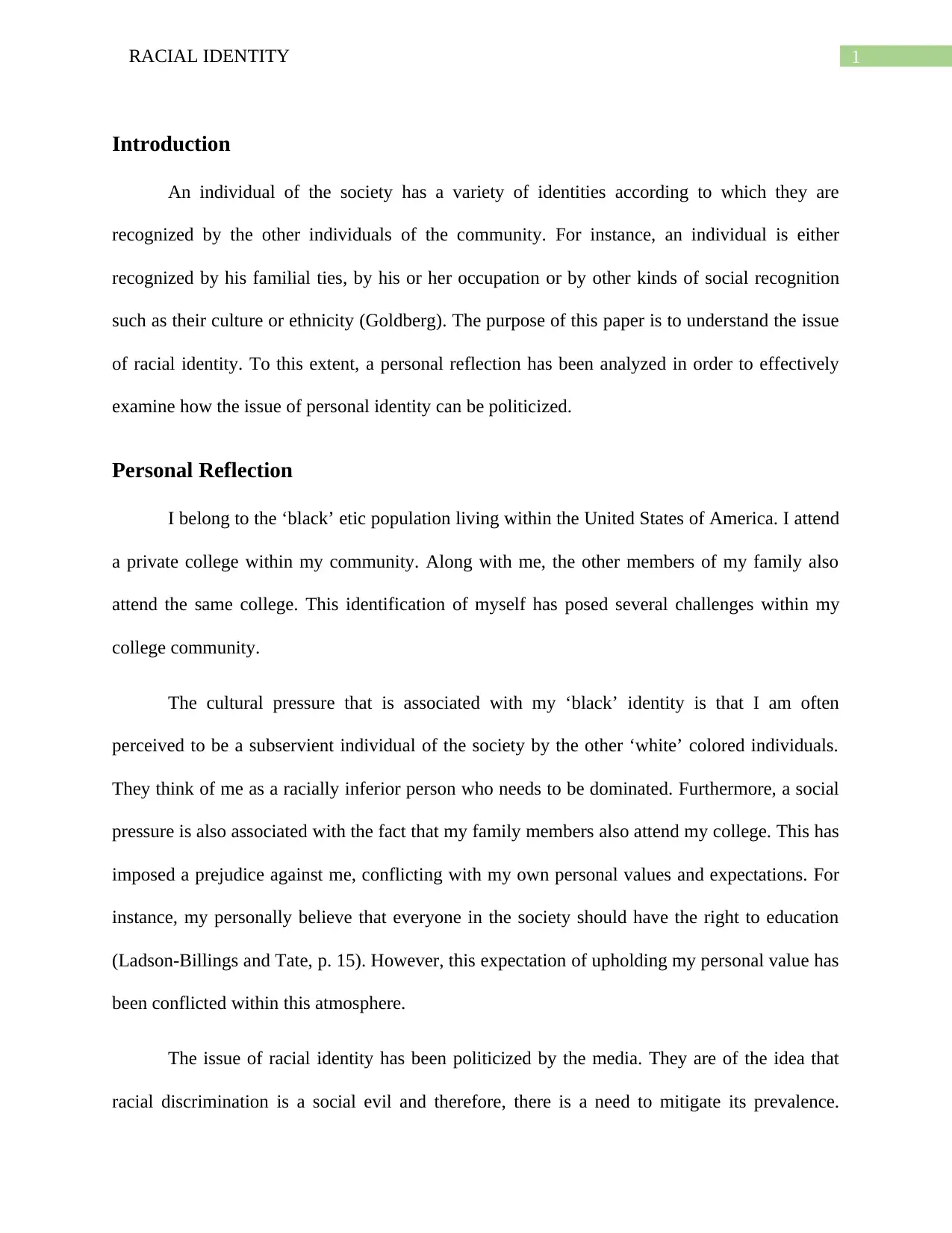
1RACIAL IDENTITY
Introduction
An individual of the society has a variety of identities according to which they are
recognized by the other individuals of the community. For instance, an individual is either
recognized by his familial ties, by his or her occupation or by other kinds of social recognition
such as their culture or ethnicity (Goldberg). The purpose of this paper is to understand the issue
of racial identity. To this extent, a personal reflection has been analyzed in order to effectively
examine how the issue of personal identity can be politicized.
Personal Reflection
I belong to the ‘black’ etic population living within the United States of America. I attend
a private college within my community. Along with me, the other members of my family also
attend the same college. This identification of myself has posed several challenges within my
college community.
The cultural pressure that is associated with my ‘black’ identity is that I am often
perceived to be a subservient individual of the society by the other ‘white’ colored individuals.
They think of me as a racially inferior person who needs to be dominated. Furthermore, a social
pressure is also associated with the fact that my family members also attend my college. This has
imposed a prejudice against me, conflicting with my own personal values and expectations. For
instance, my personally believe that everyone in the society should have the right to education
(Ladson-Billings and Tate, p. 15). However, this expectation of upholding my personal value has
been conflicted within this atmosphere.
The issue of racial identity has been politicized by the media. They are of the idea that
racial discrimination is a social evil and therefore, there is a need to mitigate its prevalence.
Introduction
An individual of the society has a variety of identities according to which they are
recognized by the other individuals of the community. For instance, an individual is either
recognized by his familial ties, by his or her occupation or by other kinds of social recognition
such as their culture or ethnicity (Goldberg). The purpose of this paper is to understand the issue
of racial identity. To this extent, a personal reflection has been analyzed in order to effectively
examine how the issue of personal identity can be politicized.
Personal Reflection
I belong to the ‘black’ etic population living within the United States of America. I attend
a private college within my community. Along with me, the other members of my family also
attend the same college. This identification of myself has posed several challenges within my
college community.
The cultural pressure that is associated with my ‘black’ identity is that I am often
perceived to be a subservient individual of the society by the other ‘white’ colored individuals.
They think of me as a racially inferior person who needs to be dominated. Furthermore, a social
pressure is also associated with the fact that my family members also attend my college. This has
imposed a prejudice against me, conflicting with my own personal values and expectations. For
instance, my personally believe that everyone in the society should have the right to education
(Ladson-Billings and Tate, p. 15). However, this expectation of upholding my personal value has
been conflicted within this atmosphere.
The issue of racial identity has been politicized by the media. They are of the idea that
racial discrimination is a social evil and therefore, there is a need to mitigate its prevalence.
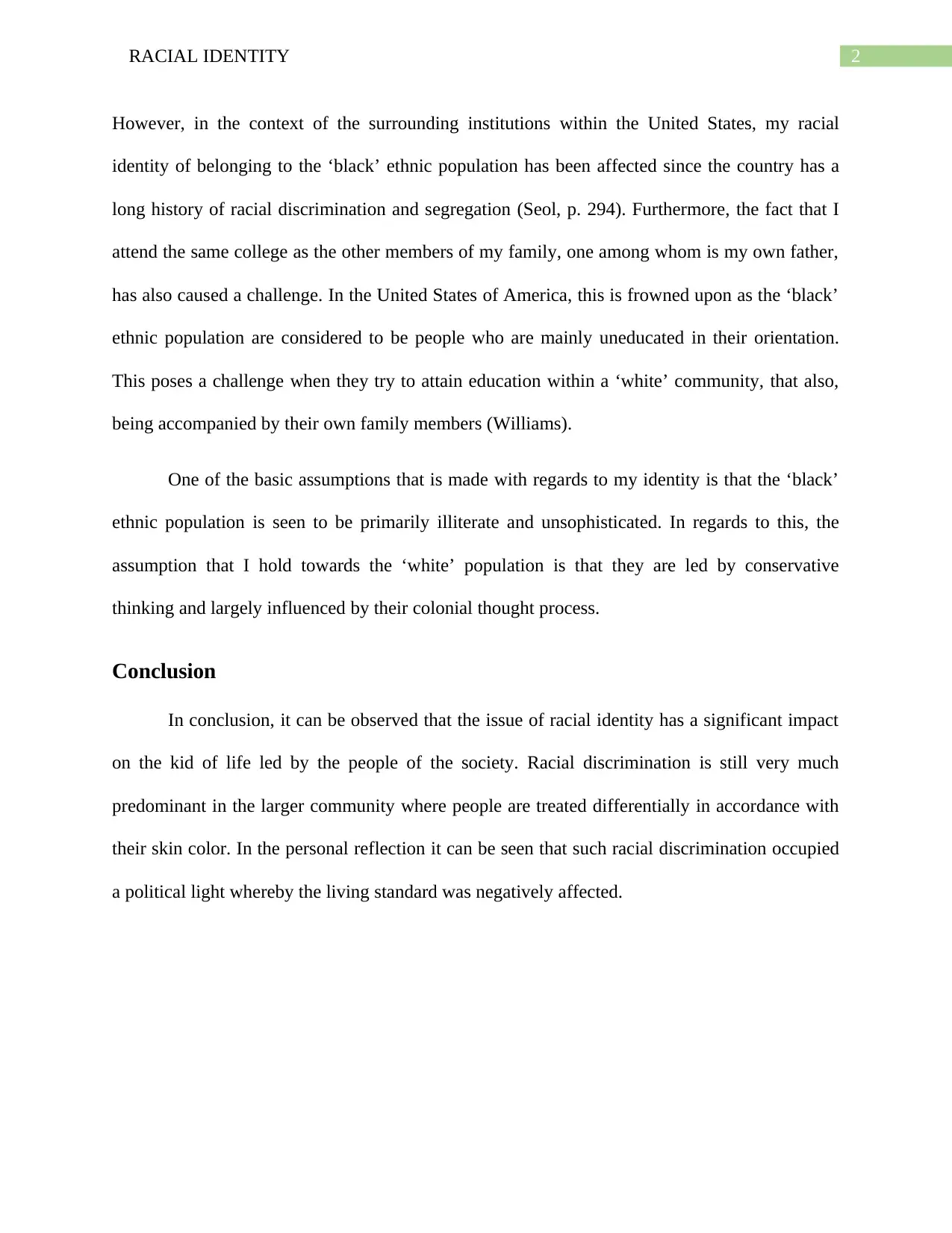
2RACIAL IDENTITY
However, in the context of the surrounding institutions within the United States, my racial
identity of belonging to the ‘black’ ethnic population has been affected since the country has a
long history of racial discrimination and segregation (Seol, p. 294). Furthermore, the fact that I
attend the same college as the other members of my family, one among whom is my own father,
has also caused a challenge. In the United States of America, this is frowned upon as the ‘black’
ethnic population are considered to be people who are mainly uneducated in their orientation.
This poses a challenge when they try to attain education within a ‘white’ community, that also,
being accompanied by their own family members (Williams).
One of the basic assumptions that is made with regards to my identity is that the ‘black’
ethnic population is seen to be primarily illiterate and unsophisticated. In regards to this, the
assumption that I hold towards the ‘white’ population is that they are led by conservative
thinking and largely influenced by their colonial thought process.
Conclusion
In conclusion, it can be observed that the issue of racial identity has a significant impact
on the kid of life led by the people of the society. Racial discrimination is still very much
predominant in the larger community where people are treated differentially in accordance with
their skin color. In the personal reflection it can be seen that such racial discrimination occupied
a political light whereby the living standard was negatively affected.
However, in the context of the surrounding institutions within the United States, my racial
identity of belonging to the ‘black’ ethnic population has been affected since the country has a
long history of racial discrimination and segregation (Seol, p. 294). Furthermore, the fact that I
attend the same college as the other members of my family, one among whom is my own father,
has also caused a challenge. In the United States of America, this is frowned upon as the ‘black’
ethnic population are considered to be people who are mainly uneducated in their orientation.
This poses a challenge when they try to attain education within a ‘white’ community, that also,
being accompanied by their own family members (Williams).
One of the basic assumptions that is made with regards to my identity is that the ‘black’
ethnic population is seen to be primarily illiterate and unsophisticated. In regards to this, the
assumption that I hold towards the ‘white’ population is that they are led by conservative
thinking and largely influenced by their colonial thought process.
Conclusion
In conclusion, it can be observed that the issue of racial identity has a significant impact
on the kid of life led by the people of the society. Racial discrimination is still very much
predominant in the larger community where people are treated differentially in accordance with
their skin color. In the personal reflection it can be seen that such racial discrimination occupied
a political light whereby the living standard was negatively affected.
⊘ This is a preview!⊘
Do you want full access?
Subscribe today to unlock all pages.

Trusted by 1+ million students worldwide
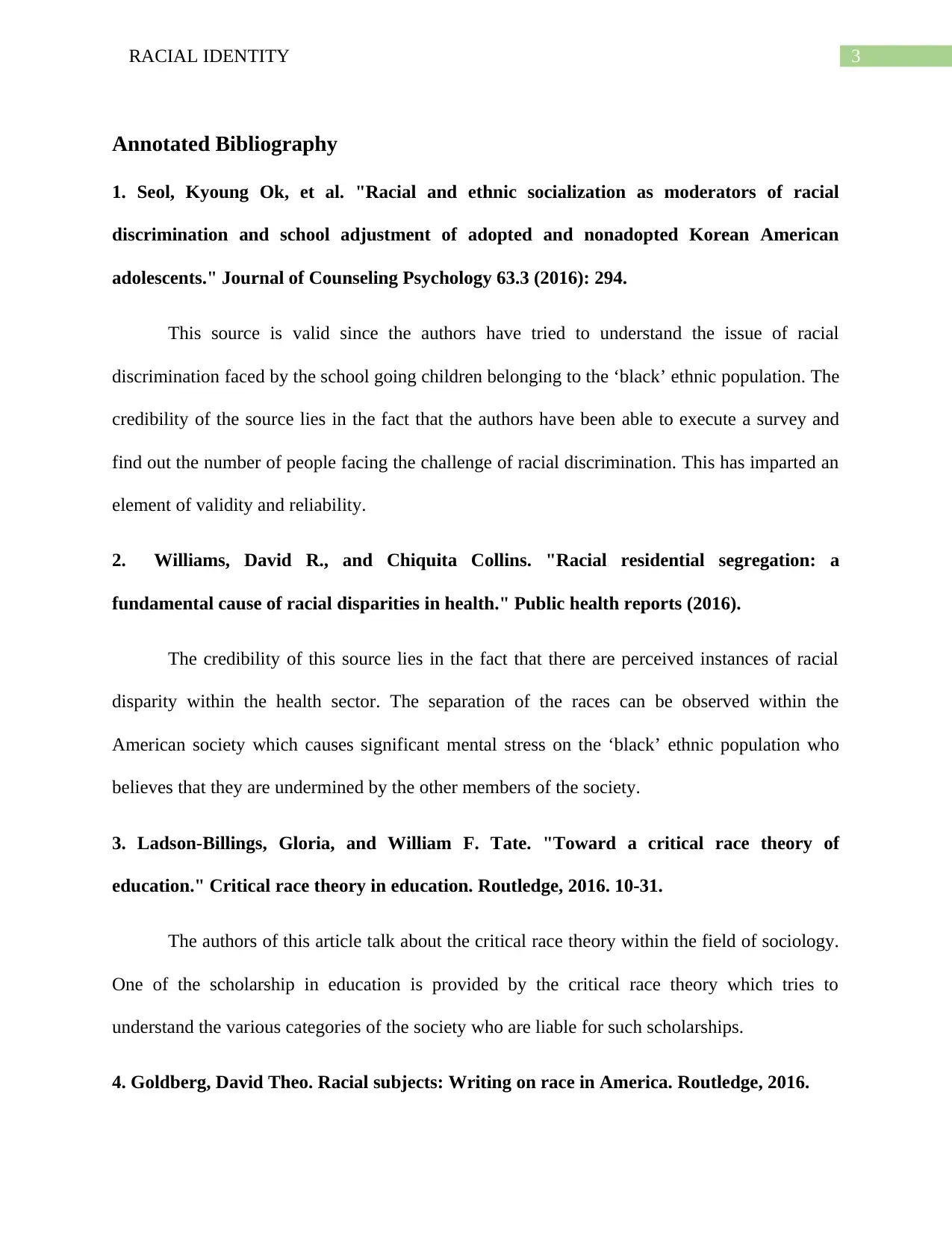
3RACIAL IDENTITY
Annotated Bibliography
1. Seol, Kyoung Ok, et al. "Racial and ethnic socialization as moderators of racial
discrimination and school adjustment of adopted and nonadopted Korean American
adolescents." Journal of Counseling Psychology 63.3 (2016): 294.
This source is valid since the authors have tried to understand the issue of racial
discrimination faced by the school going children belonging to the ‘black’ ethnic population. The
credibility of the source lies in the fact that the authors have been able to execute a survey and
find out the number of people facing the challenge of racial discrimination. This has imparted an
element of validity and reliability.
2. Williams, David R., and Chiquita Collins. "Racial residential segregation: a
fundamental cause of racial disparities in health." Public health reports (2016).
The credibility of this source lies in the fact that there are perceived instances of racial
disparity within the health sector. The separation of the races can be observed within the
American society which causes significant mental stress on the ‘black’ ethnic population who
believes that they are undermined by the other members of the society.
3. Ladson-Billings, Gloria, and William F. Tate. "Toward a critical race theory of
education." Critical race theory in education. Routledge, 2016. 10-31.
The authors of this article talk about the critical race theory within the field of sociology.
One of the scholarship in education is provided by the critical race theory which tries to
understand the various categories of the society who are liable for such scholarships.
4. Goldberg, David Theo. Racial subjects: Writing on race in America. Routledge, 2016.
Annotated Bibliography
1. Seol, Kyoung Ok, et al. "Racial and ethnic socialization as moderators of racial
discrimination and school adjustment of adopted and nonadopted Korean American
adolescents." Journal of Counseling Psychology 63.3 (2016): 294.
This source is valid since the authors have tried to understand the issue of racial
discrimination faced by the school going children belonging to the ‘black’ ethnic population. The
credibility of the source lies in the fact that the authors have been able to execute a survey and
find out the number of people facing the challenge of racial discrimination. This has imparted an
element of validity and reliability.
2. Williams, David R., and Chiquita Collins. "Racial residential segregation: a
fundamental cause of racial disparities in health." Public health reports (2016).
The credibility of this source lies in the fact that there are perceived instances of racial
disparity within the health sector. The separation of the races can be observed within the
American society which causes significant mental stress on the ‘black’ ethnic population who
believes that they are undermined by the other members of the society.
3. Ladson-Billings, Gloria, and William F. Tate. "Toward a critical race theory of
education." Critical race theory in education. Routledge, 2016. 10-31.
The authors of this article talk about the critical race theory within the field of sociology.
One of the scholarship in education is provided by the critical race theory which tries to
understand the various categories of the society who are liable for such scholarships.
4. Goldberg, David Theo. Racial subjects: Writing on race in America. Routledge, 2016.
Paraphrase This Document
Need a fresh take? Get an instant paraphrase of this document with our AI Paraphraser

4RACIAL IDENTITY
The validity and credibility of this source lies in the fact that racism is understood as an
exclusionary power relations rather than a component of hate emotions. As a result of this, the
sources looks in to the everyday life of an individual to understand how the personal sphere is
politicized.
The validity and credibility of this source lies in the fact that racism is understood as an
exclusionary power relations rather than a component of hate emotions. As a result of this, the
sources looks in to the everyday life of an individual to understand how the personal sphere is
politicized.
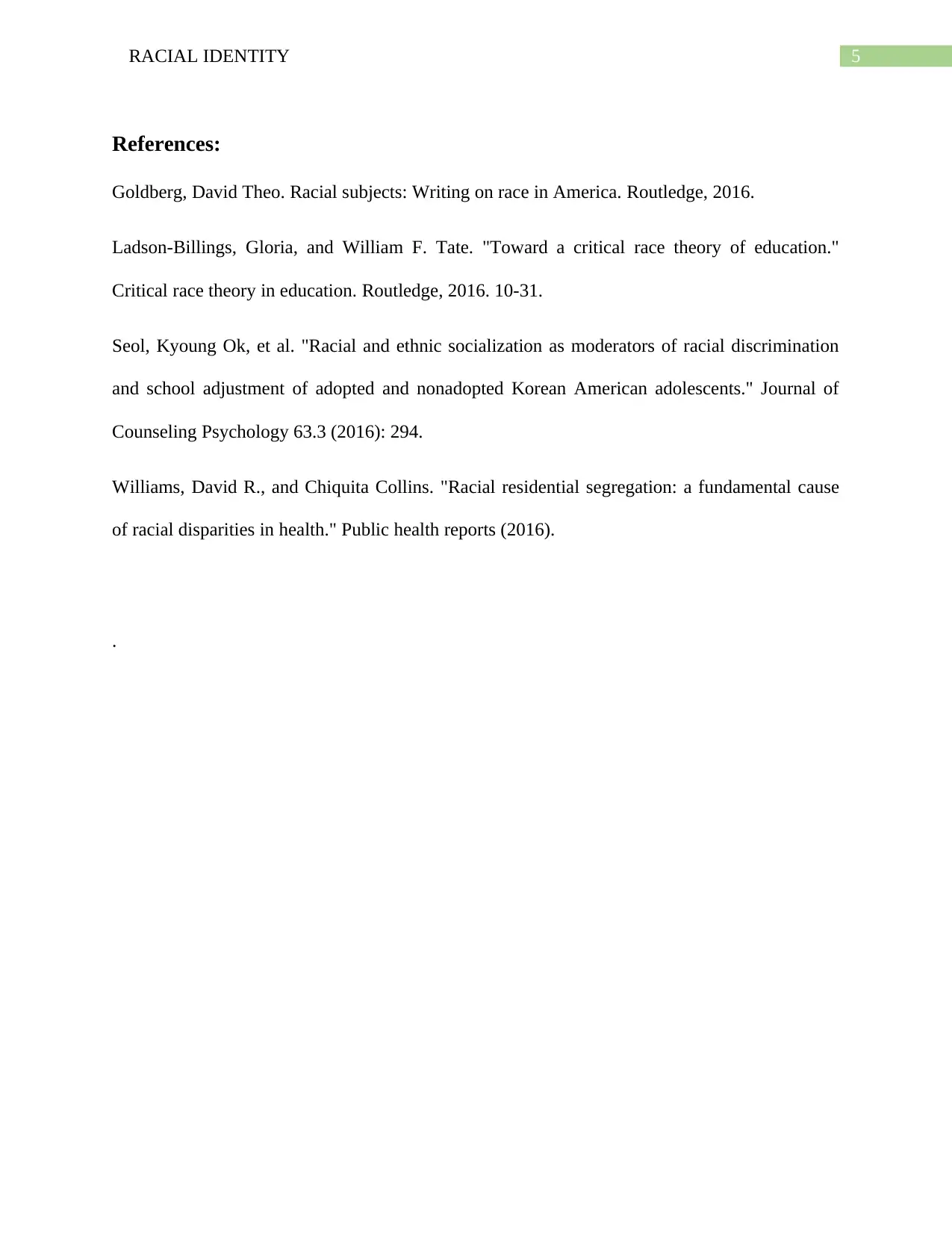
5RACIAL IDENTITY
References:
Goldberg, David Theo. Racial subjects: Writing on race in America. Routledge, 2016.
Ladson-Billings, Gloria, and William F. Tate. "Toward a critical race theory of education."
Critical race theory in education. Routledge, 2016. 10-31.
Seol, Kyoung Ok, et al. "Racial and ethnic socialization as moderators of racial discrimination
and school adjustment of adopted and nonadopted Korean American adolescents." Journal of
Counseling Psychology 63.3 (2016): 294.
Williams, David R., and Chiquita Collins. "Racial residential segregation: a fundamental cause
of racial disparities in health." Public health reports (2016).
.
References:
Goldberg, David Theo. Racial subjects: Writing on race in America. Routledge, 2016.
Ladson-Billings, Gloria, and William F. Tate. "Toward a critical race theory of education."
Critical race theory in education. Routledge, 2016. 10-31.
Seol, Kyoung Ok, et al. "Racial and ethnic socialization as moderators of racial discrimination
and school adjustment of adopted and nonadopted Korean American adolescents." Journal of
Counseling Psychology 63.3 (2016): 294.
Williams, David R., and Chiquita Collins. "Racial residential segregation: a fundamental cause
of racial disparities in health." Public health reports (2016).
.
⊘ This is a preview!⊘
Do you want full access?
Subscribe today to unlock all pages.

Trusted by 1+ million students worldwide
1 out of 6
Related Documents
Your All-in-One AI-Powered Toolkit for Academic Success.
+13062052269
info@desklib.com
Available 24*7 on WhatsApp / Email
![[object Object]](/_next/static/media/star-bottom.7253800d.svg)
Unlock your academic potential
Copyright © 2020–2026 A2Z Services. All Rights Reserved. Developed and managed by ZUCOL.





